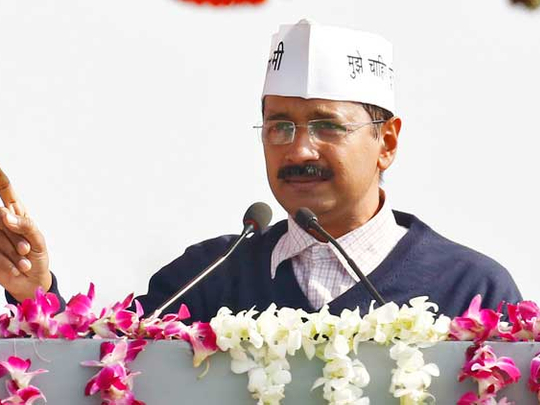
New Delhi: Delhi chief minister Arvind Kejriwal on Friday announced his decision to resign after his party failed to get majority support in tabling his pet anti-graft bill in the assembly.
He was expected to call on Lieutenant Governor Najeeb Jung and hand over his government’s resignation after a meeting of his Cabinet.
After a daylong drama in the Delhi assembly, Kejriwal first tabled the contentious Jan Lokpal Bill and later declared that he had not after the vociferous opposition forced voting on whether the bill should be introduced. Kejriwal’s government polled a mere 27 votes in its favour while 42 lawmakers voted to veto tabling of the bill.
An embarrassed Kejriwal later addressed the assembly amid demands of the opposition to quit and blamed the main opposition Bharatiya Janata Party (BJP) and Congress party — which helped him form the government on December 28 by extending its outside support. He accused the two parties of forming an alliance after the Kejriwal government action against the Reliance Industries chief Mukesh Ambani.
“This appears to be our last session in the Delhi assembly. I will consider myself fortunate if I have to sacrifice the chief minister’s post and my life to eradicate corruption … we are willing to sacrifice our government and we will take this revolution to parliament,” Kejriwal said in his address, dropping broad hints that he had made up his mind to quit and go to upcoming general elections portraying himself as a victim of the BJP-Congress nexus in his fight against corruption.
“We will fight on the streets. We are not here to save our government, but save the nation from corruption,” Kejriwal added.
Kejriwal’s Aam Aadmi Party (AAP) had won 28 seats in the 70-member hung Delhi assembly and got the offer to form the government after the single largest party BJP which won 32 seats refused the offer sighting lack of numbers.
As Kejriwal was speaking in the assembly, word was sent to his party workers to assemble at its office located at Hanuman Road near downtown Connaught Place. He announced his decision to step down after meeting with party workers.
The stage was set for the impending clash with Delhi Lieutenant Governor Najeeb Jung, who wrote a letter to assembly Speaker M.S. Dhir. “Since the bill is not approved by me, it may not be considered for discussion,” Jung said in his letter, which was read out by Speaker Dhir, following persistent demands of the opposition after he initially declined to do so.
According to rules, Delhi which enjoys limited statehood is not entitled to introduce, debate or pass any bill meant to amend existing laws without prior approval of the federal home ministry. Since the Kejriwal government refused to share a copy of the Jan Lokpal Bill with the home ministry, federal authorities asked Lieutenant Governor Jung not to give his sanction to it.
Chaotic scenes prevailed as soon as speaker Dhir announced that the bill had been tabled and invited debate leading to repeated adjournment of the assembly. The Congress party threatened to withdraw its outside support if the government insisted on introducing the contentious bill.
Both the BJP and Congress party said that, while they were in favour of passage of the anticorruption legislation, they would not support any unconstitutional procedure to pass it.
“We always supported AAP for bringing the financial bill. Even for Jan Lokpal Bill. We voted for LG’s stand. We wanted to abide by the constitution,” Arvinder Singh Lovely, the Delhi unit chief of the Congress party said.
BJP leader Harsh Vardhan reacted to Kejriwal’s accusation, saying he has mastered the art of lying. “We are more dedicated to the Jan Lokpal Bill than AAP … The fight against corruption is our ideology and purpose of life,” Harsh Vardhan added.
Passing the Jan Lokpal Bill was high on the agenda of the AAP. However, it ran into trouble at various stages with Kejriwal trying to use it to paint both BJP and Congress party as opposed to the fight against corruption. Kejriwal’s attempt to hold the special three-day assembly session in a stadium to enable public witness the debate also did not materialise as the Delhi High Court ruled that the session could not be held outside the designated premises without a valid reason.
Delhi’s Jan Lokpal Bill also was seen as being in conflict with the Lokpal Bill passed by the national parliament in December last year.
In the meanwhile, the Delhi High Court yesterday agreed to hear a plea against the Lieutenant Governor’s power to prevent tabling of a bill in the assembly and posted Tuesday for hearing it.












